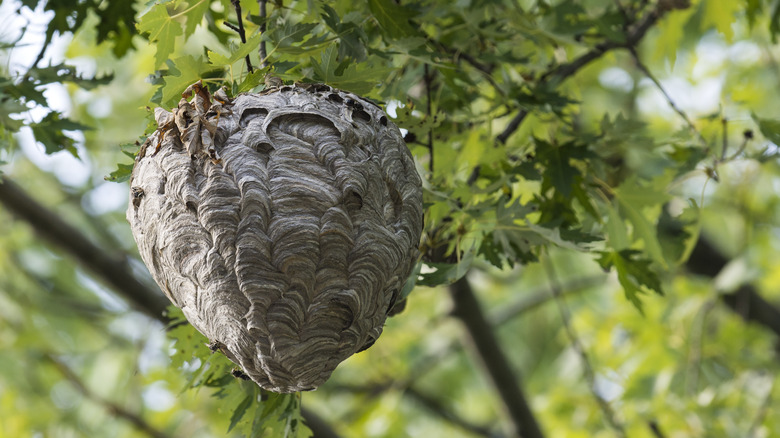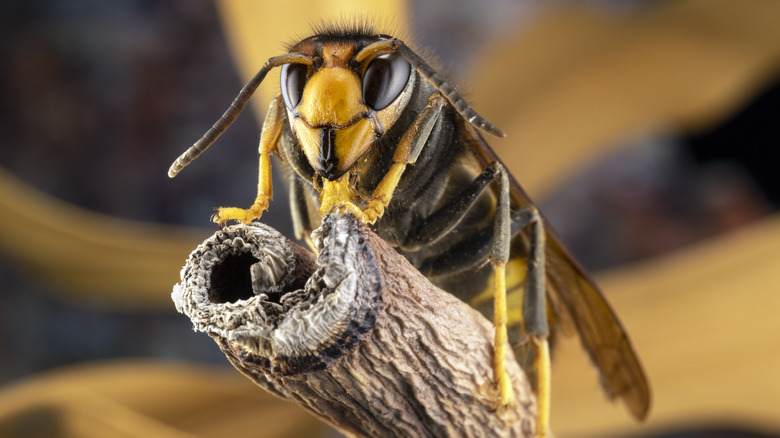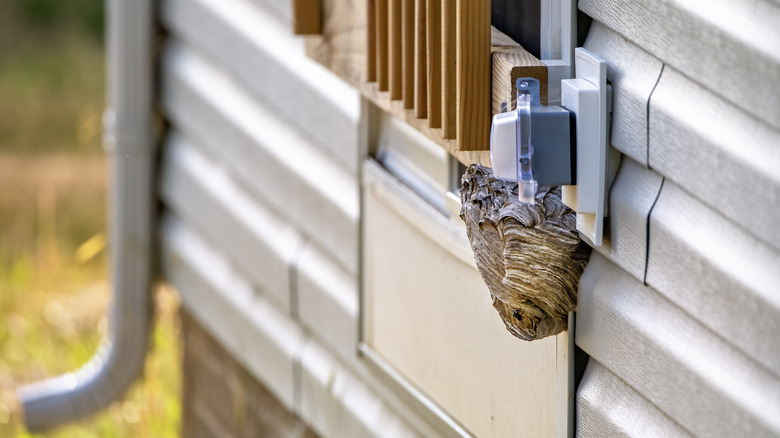What To Do If You Find Hornets In And Around Your Home
Hornets are a type of wasp and are usually some of the more aggressive of the species. When they make a nest in your home or yard, it can cause all sorts of problems. Getting rid of them isn't easy, though, and it can be quite dangerous for anyone who ends up too close. That's why it's important to turn to the professionals for help.
Ian Williams is a Board-Certified Entomologist and Certified Wildlife Control Professional. He has 15 years of experience handling all sorts of pests that invade homes and businesses, including hornets. Currently, he works at Orkin. Ian Williams spoke exclusively to Outdoor Guide about how to get rid of hornets, warning that it isn't an easy task and can be quite dangerous if done incorrectly. You can't just use any trick you see to get rid of them. Many methods found online, and even products made specifically to kill insects will end up making the situation worse.
"Improper use of pesticides is also dangerous; always consult with a trained pest professional," he mentioned. "If you plan on using a DIY spray, follow the directions on the label. Lastly, not all products labeled for hornets are the best choice for hornets. Typically, a quick 'knockdown' is key to controlling a nest when it is being treated."
How to get rid of hornets around your home
Despite the dangers these insects pose, hornets aren't entirely harmful, and you may want to think twice before killing one of these insects. According to Williams, "If a hornet nest isn't posing an immediate danger, it can be left alone, especially if it is in an area [that] people do not frequent. Hornets can be beneficial as they prey on and reduce the number of other insects, such as crickets, grasshoppers, flies, and similar pests in backyards."
While hornets can be helpful, they also pose dangers and can be a serious threat to honey bees. If you have a lot of bees that enter your yard or your pets or family are in danger, it may be worth removing the hornet nest to keep them safe. However, as Williams notes, "There are risks to removing a nest, as hornets can become aggressive toward humans." Also, before you start killing off any yellow-and-black flying insect, you may want to first make sure it's actually a hornet or another type of wasp and not a friendly bee.
But how do you remove hornets safely? It isn't easy. "Hornets can make nests in voids, as well as on buildings (typically under eaves) or in trees. Attempting to remove them anywhere can be a safety challenge, especially when dealing with ladders and heights or in confined spaces like an attic," William says. He suggests hiring professionals, such as Orkin, to do the removal.
How to keep hornets from making a home on your property
Since hornets are quite a problem once they make their nest around your home, you'll want to prevent them from getting established at all. The best way is to eliminate as many food sources as possible. Williams says, "Regularly wash and clean garbage cans and dispose of garbage daily to eliminate odors and food sources that might attract pests."
Another option is to make sure you don't have any holes or crevices readily available for these pests. "Ensure doors and windows are sealed, keep window screens repaired and tight-fitting, and close doors whenever possible." Williams also emphasizes, "Make sure all holes or openings that lead to void areas in your home are sealed to reduce the potential for hornets to nest inside." If you do have holes and entryways like vents that are hard to keep pests out, consider covering these spots with small mesh. Check for any holes in screens and seams of windows as well to make sure you aren't attracting pesky insects like hornets and other wasp types into your yard.
The final note from Williams is to think about what you're doing after it gets dark. "European hornets forage at night and are attracted to lights inside houses, so keep windows and doors closed if you notice European hornet activity." If you have outdoor lights, you may also want to put them on timers so they aren't lighting up all night and attracting hornets.


